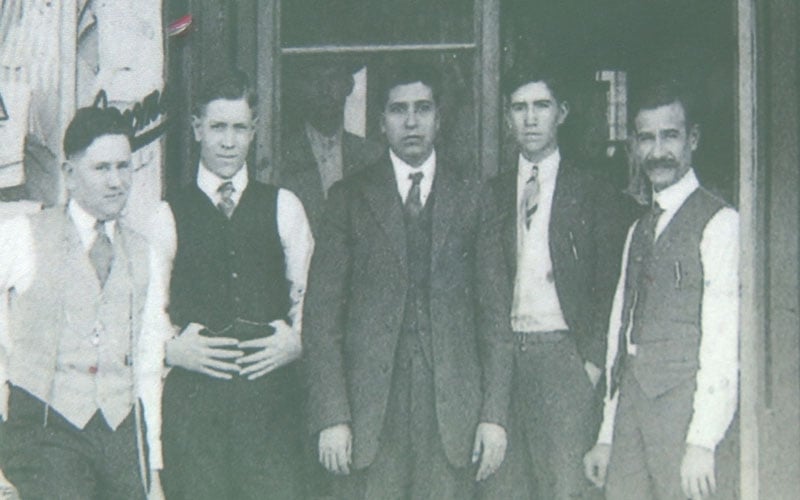
A photo of Carlos Vélez-Ibáñez’s father, second from the right. Vélez-Ibáñez has family in both Sonora, Mexico, and in Arizona. (Photo courtesy of Carlos Vélez-Ibáñez)
While more Republican presidential candidates are using “anchor baby” to talk about birthright citizenship, Americans at the center of the debate question the controversial term.
“Well, see even the notion of anchor baby is ridiculous,” said Carlos Vélez-Ibáñez, a professor and chairman of the Department of Transborder Studies at Arizona State University.
“People have been anchoring on both sides of the border for generations,” he said.
Vélez-Ibáñez not only teaches his students about the cross-border migration, he’s a living example.
“So if you want to call me an anchor, no longer a baby, I guess I am one of those, too,” he said.
Vélez-Ibáñez has ties on both sides of the border. He was born in Arizona. His family had been in Sonora visiting relatives and was headed home to Tucson when his mother went into labor.
“The hospital was right next to the cyclone fence that divided Sonora from Arizona … and my mother said that my crib was placed next to the window … My feet were placed south and my head was always north,” Vélez-Ibáñez said.
The term “anchor baby” refers to children of undocumented immigrants born on U.S. soil. Donald Trump, the leading Republican presidential candidate, is calling for an end to birthright citizenship.
“Obviously it’s racist. I think that Trump is just trying to build his prominence,” said Francisca Porchas, the organizing director for Puente Human Rights Movement, a grass-roots immigrant advocacy organization in Phoenix. “I think he is being successful on it, to be really honest.”
A Pew Hispanic Research Center report estimates that undocumented women give birth to around 300,000 babies a year. As of 2010, around 4.5 million children under the age of 18 would fall into the category of “anchor baby” according to the report.
“As immigrant people we have a right to have a family, to have children, to give birth,” Porchas says. She and many others believe this derogatory term, normally attached to Mexican mothers, implies that the children were planned to be born in the United States as the only tie to the country.
Many mothers did not cross the border as undocumented immigrants. Some arrive on planes with visas that allow them to enter the United States legally. Their children also qualify for birthright citizenship.
“I hold both American and French citizenships. Honestly, I have never been familiar with that term. I never thought of myself as an anchor baby. It’s very weird to me,” says Anaelle Ganase, a first generation American citizen.
She was born in Miami. Her parents moved to the United States from Paris with Ganase’s two older siblings when her father accepted a job offer. Her mother was pregnant with Anaelle when they arrived.
“My dad became an American citizen about two years ago, and my mom became an American citizen, actually, about a month ago. It definitely helped that there was already an American in their family,” Ganase said.
Today, she is a sophomore psychology major at Arizona State University. For years she was the only U.S. citizen in her family.
“My brothers always made fun of me, that I was the ‘American’ of the family, and I wasn’t really French. When I was younger I sort of started forgetting the French part of me. Later on I realized the French part of me is so big and I need to embrace it,” Ganase said.
The issue of birthright citizenship includes families from various countries. Critics point out that parents from Asian countries plan trips to the United States to give birth so their children will qualify for educational and job opportunities only available to U.S. citizens.
Critics of birthright citizenship argue it rewards undocumented parents and changing the law would decrease illegal immigration.
But the Migration Policy Institute, a nonpartisan think tank in Washington, D.C., projects the number of undocumented people in the U.S. would grow from 11 million to 16 million in 2050 if birthright citizenship ended.
According to the report if lawmakers repeal birthright citizenship 4.7 million babies who would have been U.S. citizens of undocumented parents would be undocumented themselves. And by 2050 that would include three generations.
Vélez-Ibáñez says the debate over birthright citizenship crops up when state legislatures are in session or during federal elections. The term “anchor baby” has now become common on the presidential campaign trail.
“It’s an imposition made by the ignorant, made by fools,” Vélez-Ibáñez said.
He puts hope in his students.
“I rely on these generations that I teach, generations that have, what we call in spanish ‘Que son instruidos,’ that is that they are instructed, learned,” Vélez-Ibáñez said.